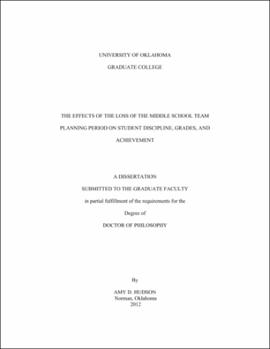| dc.contributor.advisor | Vaughn, Courtney||Maiden, Jeffrey | |
| dc.creator | Hudson, Amy D. | |
| dc.date.accessioned | 2019-04-27T21:33:24Z | |
| dc.date.available | 2019-04-27T21:33:24Z | |
| dc.date.issued | 2012 | |
| dc.identifier | 99294007802042 | |
| dc.identifier.uri | https://hdl.handle.net/11244/318999 | |
| dc.description.abstract | The middle school concept provides recommendations for schools that teach adolescents. One of the components of this philosophy is the common team planning period, which is in addition to the teacher's individual planning period. This planning period was designed to have team teachers meet together to discuss curriculum, students, and interdisciplinary units. The common team planning period was removed from the middle school studied, during the 2003-2004 school year due to budgetary constraints. This quantitative study explores the effects on student disciplinary infractions, achievement test scores in mathematics and reading, and grade point averages for two years with the common team planning period and then three years after the elimination of this practice. | |
| dc.description.abstract | The literature review addresses the components of the middle school concept, including the importance of the common team planning period. It also outlines past research on the common team planning period and the effects that this planning time for teachers has had on student achievement and disciplinary infractions. This study provides information for district leaders when contemplating whether or not to provide the common team planning period for their schools. | |
| dc.description.abstract | Five years of middle school data were analyzed on student disciplinary infractions, student achievement scores in mathematics and reading, and grade point averages. The data collected were from seventh and eighth graders at a suburban middle school during the 2002-2006 school years. The results found that the models were statistically significant in discipline infractions, student achievement scores in mathematics and reading, or grade point averages; however, this was not related to the loss of the common team planning period. | |
| dc.description.abstract | This research does not suggest that the middle school team planning period is not beneficial or irrelevant for adolescent students. It does reinforce the need for districts to have a clear plan and purpose for implementing the common team planning period and ensuring that teachers understand their specific roles during that time period. This is important information for district leaders so that they can provide guidance in professional development opportunities regarding the purpose of the common team planning period and how it can benefit students academically, behaviorally, and socially. | |
| dc.description.abstract | Future research is suggested to determine if similar results will be found in another school district that has lost the common team planning period. A qualitative study that includes teacher interviews that have experienced the loss of the common team planning period would also assist district leaders in the decision-making process of whether to eliminate or retain the common team planning period. | |
| dc.format.extent | 116 pages | |
| dc.format.medium | application.pdf | |
| dc.language | en_US | |
| dc.relation.requires | Adobe Acrobat Reader | |
| dc.subject | Middle school teaching | |
| dc.subject | Teaching teams--Case studies | |
| dc.subject | Lesson planning--Case studies | |
| dc.subject | Curriculum planning--Case studies | |
| dc.title | The effects of the loss of the middle school team planning period on student discipline, grades, achievement | |
| dc.type | text | |
| dc.type | document | |
| dc.thesis.degree | Ph.D. | |
| ou.group | Jeannine Rainbolt College of Education::Department of Educational Leadership and Policy Studies | |
